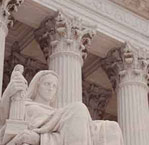
I had the pleasure of attending the oral argument before the Supreme Court in the McVeigh case (No. 05-200) on April 25 (see my April 22 post). This was only the second or third time that I had witnessed Supreme Court arguments, and this was the very first time that the Supreme Court has interpreted the Federal Employees Health Benefits Act so I will not engage in any prognostication based on the oral argument.
Tony Shelley of Miller & Chevalier, counsel for petitioner Empire Blue Cross, and an attorney for the U.S. Solicitor General’s office, Sri Srinivastan, argued the FEHB Program’s position that federal courts possess jurisdiction over carrrier lawsuits to enforce plan provisions, here the subrogation provision. Both Tony and the Solicitor General’s representative argued the case very well.
The Justices posed many questions to Tony, the Solicitor General’s representative, and McVeigh’s counsel. Chief Justice Roberts, Justice Breyer, Justice Souter, Justice Scalia, and Justice Ginsburg were the most active participants in the argument. The other Justices (with the exception of Justice Thomas) interjected points occasionally. (I am amazed at how well Justice Stevens looks at age 86.) The transcript will be posted in a few weeks at the Supreme Court’s website.
In retrospect, the key exchange from my perspective occurred at the end of the Solicitor General’s presentation when Mr. Srinivastan made the point that ultimately this case concerns money to be reimbursed to the federal treasury. McVeigh’s counsel then began to present his argument and Justice Breyer asked him to distinguish this case from the Supreme Court’s decisions in Clearfield Trust and Kimbell Foods. In Clearfield Trust, the Supreme Court held that “The rights and duties of the United States on commercial paper [in that case an employee paycheck] which it issues are governed by federal rather than local law. When the United States disburses its funds or pays its debts, it is exercising a constitutional function or power federal employee paychecks. ” McVeigh’s counsel was never able to answer this question, and Justice Breyer’s point (which, of course, was made in the Empire Blue Cross and SG briefs) resonanted with other justices, particularly Justice Souter.
I came into the argument with the opinion that the Supreme Court will rule for the Program’s position, and I came out of the Supreme Court holding the same opinion. The decision will be rendered before the end of the Supreme Court’s term in June.
